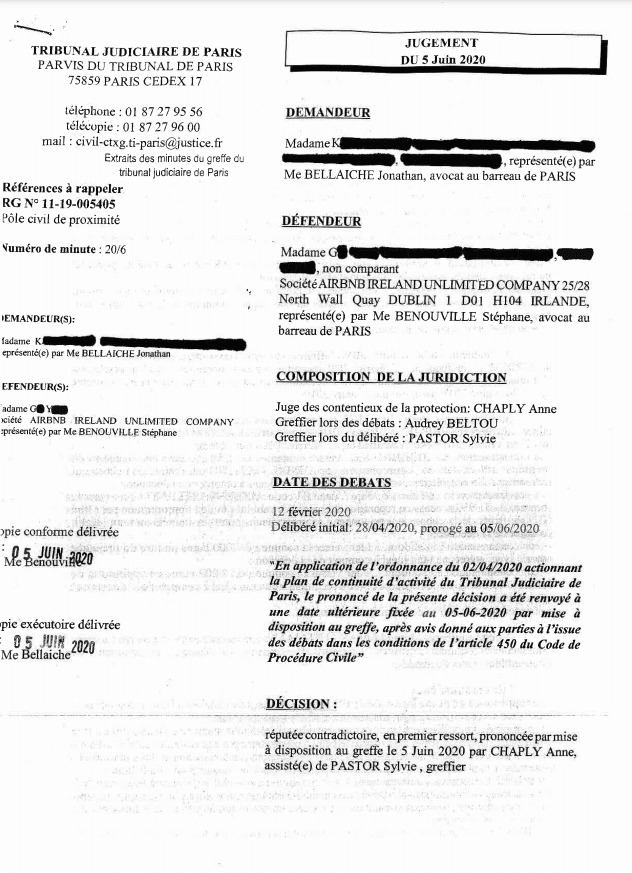

Objet de la décision
Par un jugement du Tribunal judiciaire de Paris en date du 5 juin 2020, il a été jugé que :
« La société AIRBNB IRELAND est une société ayant pour objet, par l’intermédiaire d’une plate-forme numérique prenant la forme du site internet ww.airbnb.fr qu’elle administre, la mise en relation entre des personnes souhaitant proposer leur logement à la location, « les hôtes » avec d’autres personnes en recherche d’un logement pour une courte durée, « les voyageurs ».
L’article 6-I.2 alinéa 1er et 7 de la loi n°2004-575 du 21 juin 2004 pour la confiance dans l’économie numérique (dite LCEN) dispose que « les personnes physiques ou morales qui assurent, même à titre gratuit, pour mise à disposition du public par des services de communication au public en ligne, le stockage de signaux, d’écrits, d’images, de sons ou de messages de toute nature fournis par des destinataires de ces services ne peuvent pas voir leur responsabilité civile engagée du fait des activités ou des informations stockées à la demande d’un destinataire de ces services si elles n’avaient pas effectivement connaissance de leur caractère illicite ou des faits et circonstances faisant apparaître ce caractère ou si, dès le moment où elles en ont eu cette connaissance, elles ont agi promptement pour retirer ces données ou en rendre l’accès impossible ». (…)7. « Les personnes mentionnées aux 1 et 2 ne sont pas soumises à une obligation générale de surveiller les informations qu’elles transmettent ou stockent, ni à une obligation générale de rechercher des faits ou des circonstances révélant des activités illicites ».
A contrario, lorsqu’elles jouent un rôle actif de nature à lui conférer une connaissance ou un contrôle des données, ces personnes, physiques ou morales, ont le statut d’éditeur.
En l’espèce, la plateforme AIRBNB renvoie à des conditions générales lesquelles fixent des règles d’utilisation du site, mais également la relation contractuelle des membres entre eux notamment en leur imposant le respect de ce qu’AIRBNB désigne comme étant ses valeurs et attentes, lesquelles sont pour la plupart des rappels de principes, comme la non-discrimination, ou de législation telle que les règles relatives aux animaux dangereux ou la présence d’armes. Toutefois, outre ce rappel des règles de bon comportement, elle donne des directives à ces hôtes : être réactif, accepter les demandes de réservation, éviter les annulations, maintenir une bonne évaluation globale et fournir des équipements de base, et le non-respect de ces directives peut aboutir à un retrait du contenu et/ou des pénalités.
Il est contractuellement prévu que l’hôte, en publiant du contenu sur AIRBNB, accepte de se conformer à ces règles et que AIRBNB se réserve le droit de retirer tout contenu partiellement ou en intégralité qui ne respecte pas ces règles, ses conditions générales, ses valeurs de communauté et sa politique relative aux commentaires ou pour toute autre raison, à son entière discrétion. Il est également prévu que dans le cas de manquements répétés ou particulièrement graves, AIRBNB pourra suspendre ou désactiver définitivement le ou les comptes concernés.
AIRBNB a donc un droit de regard et s’arroge le droit de retirer un contenu pour non-respect des conditions contractuelles, mais également pour toute autre raison à son entière discrétion.
Inversement, ceux qui respectent au mieux ces directives peuvent être récompensés par l’attribution du qualificatif de “superhost”.
AIRBNB se défend de faire une sélection des meilleurs hôtes en mettant en avant le caractère automatique d’un logiciel, lequel attribue cette qualification dès que les critères sont remplis. Il n’en reste pas moins qu’automatique ou non, l’attribution de ce qualificatif est le fruit de critères définis par AIRBNB lui-même, vérifiés régulièrement par AIRBNB, et aboutit à une promotion des annonces des “superhost” dès lors que leur annonce est signalée par un logo bien visible et qu’elle bénéficie d’une place privilégiée dans la liste des annonces similaires, étant précisé que AIRBNB se rémunère par un pourcentage sur les loyers perçus par l’hôte.
En dehors du contrôle des contenus des hôtes, AIRBNB a prévu des pénalités frappant les membres du contrat d’hébergement, notamment en imposant au voyageur qui quitterait postérieurement à l’heure limite d’occupation, le paiement d’une pénalité en dédommagement du désagrément subi par l’hôte ainsi que des frais accessoires. De même, AIRBNB interdit de demander, faire ou accepter une réservation en dehors de la plate-forme.
L’ensemble de ces éléments témoigne du caractère actif de la démarche de la société AIRBNB dans la mise en relation des hôtes et des voyageurs et de son immiscion dans le contenu déposé par les hôtes sur sa plate-forme.
Il est dès lors établi que la société AIRBNB n’exerce pas une simple activité d’hébergement à l’égard des hôtes qui ont recours à son site, mais une activité d’éditeur.
A ce titre, elle est en capacité de vérifier si l’hôte dispose du droit de proposer à la location un bien ou non. L’article 2.4 de ses conditions de service le confirme puisqu’il stipule : (…), par souci de transparence et aux fins de la prévention des fraudes, sous réserve des lois applicables, nous pouvons, sans y être tenus de demander aux Membres de nous fournir une pièce d’identité officielle ou autres informations, ou de se soumettre à d’autres contrôles destinés à vérifier l’identité et les antécédents des Membres, consulter des bases de données tierces ou d’autres sources d’informations pour vérifier si des Membres y figurent, et demander des rapports à des prestataires de services et si nous avons suffisamment d’informations pour idenditifier un Membre, obtenir des extraits de fichiers d’infractions pénales ou sexuelles (ou similaires) auprès des autorités locales.
Dès lors que l’hôte exerce une activité illicite par son intermédiaire, compte tenu de son droit de regard sur le contenu des annonces et des activités réalisées par son intermédiaire en qualité d’éditeur, elle commet une faute en s’abstenant de toute vérification, laquelle concourt au préjudice subi par le propriétaire.
Sa responsabilité étant retenue à ce titre, il n’est pas nécessaire d’examiner les autres arguments développés par Mme KAUFFMANN à l’appui de sa demande de condamnation de AIRBNB ».
Il ressort de ce jugement que :
- AIRBNB devait rembourser au propriétaire les commissions qu’elle a perçue du fait de la sous-location non autorisée du bien, en faisant une application de la théorie de l’accession selon laquelle la propriété immobilière donne droit sur tout ce qu’elle produit. En effet, dans la mesure où « les commissions perçues par AIRBNB sont constituées par un pourcentage des loyers payés par les voyageurs pour la sous-location du bien », alors la propriétaire est bien fondée à en obtenir le remboursement.
- AIRBNB n’exerce pas une simple activité d’hébergement WEB : « Il est dès lors établi que la Société AIRBNB n’exerce pas une simple activité d’hébergement à l’égard des hôtes qui ont recours à son site, mais une activité d’éditeur ». Le Tribunal judiciaire a en effet tiré les conséquences légales du fait que : « lorsqu’elles jouent un rôle actif de nature à lui conférer une connaissance ou un contrôle des données, ces personnes, physiques ou morales, ont le statut d’éditeur ».
- AIRBNB doit dès lors opérer un contrôle à priori et non à posteriori des annonces sur son site : « Dès lors que l’hôte exerce une activité illicite par son intermédiaire, compte tenu de son droit de regard sur le contenu des annonces et des activités réalisées par son intermédiaire en qualité d’éditeur, elle commet une faute en ne s’abstenant pas de toute vérification, laquelle concourt au préjudice subi par le propriétaire ».
- AIRBNB est responsable des actes commis par ses utilisateurs et devra répondre de tous les agissements illicites qui seront commis sur sa plateforme.
Ainsi, elle a été condamnée à payer avec exécution provisoire (exécution immédiate du jugement, nonobstant appel) :
- 51.936,61 € de sous loyer qui ont été encaissés du fait d’une sous-location abusive
- 1.558,20 € au titre des commissions perçues
- 5.000 € au titre des frais d’avocat
Soit un total de condamnation de 58.494,81 €.
Dans cette affaire, une propriétaire avait vu son logement sous-loué par sa locataire sans son autorisation sur la plateforme AIRBNB pendant 534 jours durant les années 2016 et 2017, ce qui lui avait permis d’encaisser 51.936,61 €.
Cette décision est fondatrice en ce qu’elle va définitivement mettre un terme aux agissements illicites commis sur la plateforme AIRBNB et qui pouvaient porter atteinte aux propriétaires, utilisateurs de la plateforme, syndic, et aux hôteliers dont j’assure la défense depuis de nombreuses années.
Le jeu de l’illicite ne sera désormais plus rentable pour la plateforme ; si elle ne contrôle pas, elle devra en assumer les conséquences préjudiciables qui se chiffrent à des montants colossaux. Cette décision était attendue, elle devait arriver.
Cette décision est le fruit d’une aventure judiciaire de plusieurs années visant à responsabiliser la plateforme AIRBNB en permettant aux propriétaires de récupérer les loyers illicites et en permettant désormais à toute victime d’assigner la plateforme en cas de dommages commis par son intermédiaire.
AIRBNB ne peut désormais plus se prévaloir d’un statut d’hébergeur de contenus qui ne lui était pas applicable et qui lui permettait de s’enrichir grâce à des agissements illicites.
Le socle juridique existait pour responsabiliser les géants du web, la justice garante de notre état de droit l’a fait respecter.
Olivia Zahedi et Jonathan BELLAICHE

